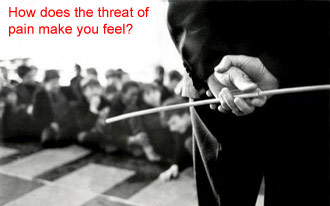Shock Collars: Do You Really Want To Hurt Me?
 Shock collars were made illegal in Wales in 2010. They are however not illegal in England and Scotland and are in fact easily obtainable. That's more than a little bit scary when you think about it. A device that gives an animal an electric shock at the press of a button is out there for all to buy.
Shock collars were made illegal in Wales in 2010. They are however not illegal in England and Scotland and are in fact easily obtainable. That's more than a little bit scary when you think about it. A device that gives an animal an electric shock at the press of a button is out there for all to buy.
I can't help wondering, as a nation of dog lovers, how there is even a market for these devices?
Are there dog owners in our midst who actually want to cause their dogs pain? I suspect not (not the majority anyway, I hope). So why are so many of these devices still being sold and used by otherwise caring and loving dog owners? Are the dog owning public so willing to inflict pain on their dogs or are they being misled in some way?
We live in what is increasingly a nanny state. We are protected from ourselves and our own free-will by numerous laws, rules and regulations. The more we are babied the more we seem to rely on authorities to guide us in all manner of right, wrongs and common sense matters.
Could this explain why so many otherwise kind and caring people allow their dogs to be shocked and hurt in the name of training?
Are they thinking "if it is legal it can't be that bad"? Is this also seemingly backed up by those dog trainers who advocate the use of shock collars and other forms of punishment in their training methods?
If someone is having issues with an aspect of their dog's behaviour they may, quite sensibly, look for a local dog trainer to help them. If they happen upon a trainer who uses negative methods (those sort of trainers are not illegal either!), what will happen next? We hope the owner would see their dog in pain and sack the trainer. But the dog trainer is assumed to be qualified and skilled and to have the dog's best interest at heart, aren't they? The trainer, like the doctor or the solicitor etc., is often revered and not to be contradicted. You trust them and their supposed qualifications. You may therefore simply go along with their judgement.
Add to this a sense of urgency (the dog is driving me mad and I want a quick fix) and in some cases a certain amount of ignorance regarding how these devices work (not to mention lack of knowledge of alternatives) and we can maybe start to see why an implement of torture is still being used on dogs all over the world by otherwise dog loving people.
Do they realise the pain caused to their dog and the dreadful negative effects that can follow this method of dog training?
Are we looking at callous owners who don't care if their dogs are hurt and punished or we are seeing a chain of misguided trust and confusion?
Isn't it obvious what these electronic shock collars do? Not necessarily. The sellers and manufacturers are aware how ghastly these devices would sound to a potential purchaser if the language used was 100% transparent. Quite often these 'training devices' use diluted language in the product titles and descriptions.
I looked at a few of these electric shock collars online and not many were even upfront enough to call the gadget a 'shock collar' let alone mention the words 'electric shock' or even 'shock'. Some of the most common descriptions were 'Remote Dog Training Collar', 'Electronic Remote Training & Anti Bark Collar' and 'Pet Dog Correction Collar'. The descriptions were not much clearer, with the word 'static' more likely to be used than the word 'shock'. I also came across 'electrical impulses' and 'nicks'. Really alarmingly, one device went as far as to claim to be 'humane'. An 'Electronic Remote Control Dog Trainer' might sound like a great invention but don't be fooled by this wording. What you are being persuaded to purchase is an electric shock collar.
And it doesn't end there. What of the trainers who advocate their use?
What language is used when peddling their implement of choice to the dog loving public?
Advocates of e-collars often claim the devices do not hurt the dog. So what does it feel like? Well, it feels like an electric shock, because that is exactly what it is. E-collar users are often quick to point out that the level of the shock can be turned up or down and that it doesn't hurt on the lower levels. You have to wonder really... if it doesn't hurt then surely it wouldn't work.
It is interesting to hear how a user of shock collars described them on the D for Dog forum a couple of years ago. The poster explained that he was a professional UK dog trainer who used "e collars" and referred to the shock as a "stim" (stimulation), "mild static" and even "pressure". It makes me wonder why? Is it to distance himself from what he is actually doing or does he talk that way to lure clients into feeling less like they are hurting their dogs and therefore make them more likely to use his services?
Without repeating all the posts I will simply conclude that he was worryingly persuasive. I think he missed his calling as a door-to-door sales man. He was one of those chaps that could sell ice to the Eskimos. He made shocking your dog sound not only OK but like the most humane approach going. You can't help worrying how many people he has persuaded to give it a try.
Do people realise exactly what they are buying into and what it does to their dog? Let's be really clear. A shock collar is a collar that is worn around the dog's neck and at the push of a button it gives the dog an electric shock. They are also sometimes referred to as electronic collars, electric collars or e-collars. But don't be fooled. If someone mentions using an e-collar they mean a shock collar.
Let's be really clear. A shock collar is a collar that is worn around the dog's neck and at the push of a button it gives the dog an electric shock. They are also sometimes referred to as electronic collars, electric collars or e-collars. But don't be fooled. If someone mentions using an e-collar they mean a shock collar.
Vet Joe Inglis posted to D for Dog "Having tried one of these devices on a low setting on my hand I know how unpleasant they are, and from my experiences and from talking to experienced trainers and behaviourists I also know how unnecessary they are. There are so many better alternatives based on positive reinforcement techniques and avoidance that there is no place for these collars in my view."
The e-collar trainer was not pleased with Joe's reply. Apparently, as he is a vet rather than a dog trainer/behaviourist, his opinion is not valid. I wonder why the e-collar advocate got so upset at Joe's post? Why was he so quick to dismiss Joe as not being qualified to give an opinion? As dog owners and dog lovers, aren't we all entitled to an opinion when it comes to questions such as shall we or shall we not train our dogs using electric shocks?
This isn't a dog training blog but I do just want to add something else that needs to be addressed.
Causing your dog pain when you use an e-collar is not your only concern.
Many people thinking of using a shock collar on their dog may be tempted by the supposed 'quick fix' claim of these devices. But are they being hoodwinked into thinking all their dog's problems will be solved quickly, easily and with no repercussions? Absolutely. The reality is more likely to be that the shock collar will end up causing more problems than it solves, especially long term.
There is no discernable link between you (the e-collar) and the pain, as far as the dog is concerned. So you risk the dog attributing the pain to something else entirely, which can lead to a whole host of new issues for you and your dog. Also, the cause of the dog's unwanted behaviour is never addressed.
You need to communicate with your dog, understand the cause of their behaviour and deal with that. Dogs Trust use this as an example: "If a dog is barking excessively the first port of call should always be the vet so any medical issues can be ruled out. A dog could also be barking because he is frustrated, guarding, bored or scared, so to successfully tackle the issue it is important to understand why the barking is happening in the first place."
Dogs Trust use this as an example: "If a dog is barking excessively the first port of call should always be the vet so any medical issues can be ruled out. A dog could also be barking because he is frustrated, guarding, bored or scared, so to successfully tackle the issue it is important to understand why the barking is happening in the first place."
Is something that is unpleasant or even painful ever the best way to train a dog? What does it ultimately do to your dog? What does it do to your relationship with your dog? If you didn't already have an anxious, fearful or phobic dog you could soon have one.
Positive dog training techniques are the way to go and it is not hard to see why.
It is more humane, more effective (does anyone learn well under stress?) and doesn't damage your relationship with your dog.
What kind of effect do shock collars have on dogs? The RSPCA published this report in 2006 - The use of shock collars and their impact on the welfare of dogs
Some notable paragraphs from the report are:
"Given the lack of scientific evidence for the efficacy of behavioural modification using shock collars, particularly in the long term, in addition to the potential for mistakes or deliberate abuse and the difficulty in correcting such errors, the widespread use of these devices must be carefully considered." the report states.
Before anyone wonders about the really hard cases where euthanasia looms, this seems to be a good point to follow up that paragraph (taken from the same report):
"Animal trainers and clinical behaviourists have an obligation to use the least aversive means necessary to produce behavioural change. Individuals vary as to whether this allows for the use of shock collars as last resort, when positive methods have been unsuccessful and failure to modify the dog's behaviour would result in compromised welfare in the long term."
This doesn't include the dog owner who, head in hands, claims to have tried everything. Often, I am sorry to say, they probably haven't. Jumping on the "I've tried everything" bandwagon just won't wash. But it is a point worth mentioning because there will always be people who justify the use of punishment in a dog training scenario by saying it is better than euthanising a dog who seemingly can't be rehabilitated using only positive training methods.
So if you want to ditch the 'no pain, no gain' attitude and look for a trainer who shares your progressive beliefs, how do you find that trainer?
The Association of Pet Dog Trainers (APDT) in the UK believe in non-aversive methods "that apply the principles of kindness fairness and effectiveness and are in keeping with modern learning theory." Their site can help you find an approved APDT trainer in your area.
The APBC (Association of Pet Behaviour Counsellors) feels that "behaviour problems can be best addressed through behaviour modification programmes based on an understanding of the motivation for each dog's behaviour, and the use of humane, reward-based training methods."
Over to you:
- Do you think there is a time and place for the use of shock collars in dog training?
- Do you think they should be banned outright or only available to certain qualified professionals?
- Are you a trainer who advocates the use of shock collars or actively opposes their use?
- Are aversive and punitive dog training methods out of date?
- Does punishment in the form of a shock produce fast results and what about possible long term effects?
By Jenny Prevel
© D for Dog www.dfordog.co.uk
This article belongs strictly to D for Dog and we do not authorise the copying of all or any part of it.

Excellent, well researched article. I couldn't agree more. I like the fact that you haven't just pointed out the pitfalls of using a torture device, but have given alternatives. Well done
I do know of someone who has used such a device. A gun dog owner. What a pity they are very old school and don't understand dogs at all. I am 65. A year ago I aquired the worst border collie I have ever had. With patience a year later he has done 2 kennel club obedience shows and as had 2 3rd places. I am so proud of him. He is still very naughty at times but very loving. I am so proud of my Frankie. Liver cake works wonders
A little while ago I was shocked to see a popular TV dog trainner use an electric collar. Because it was him a lot of people think it's ok. He should be ashamed
i think anyone using these devices should be made to wear one themselves
Thank you for the article! I agree with you! Now, 8 years later, there is even more information about shock collars.